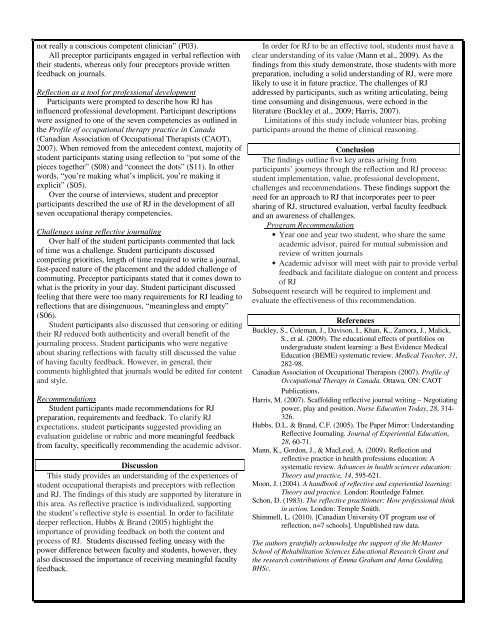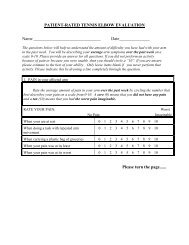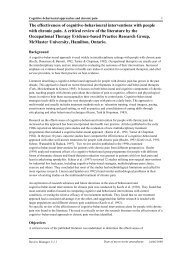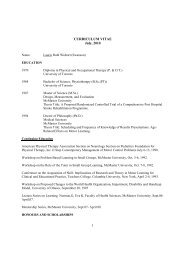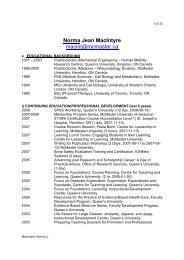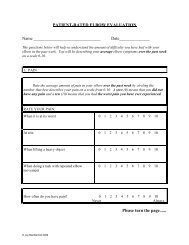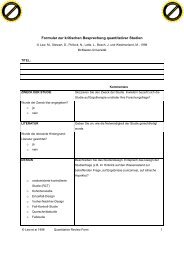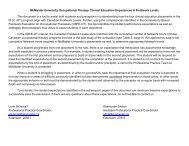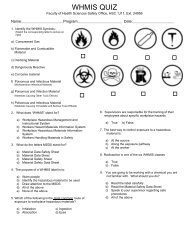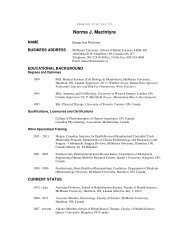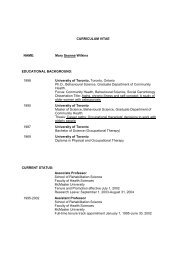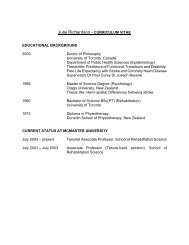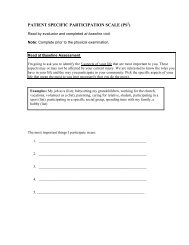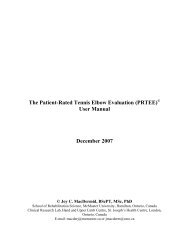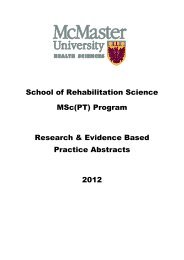Evidence Based Practice Symposium - McMaster University
Evidence Based Practice Symposium - McMaster University
Evidence Based Practice Symposium - McMaster University
You also want an ePaper? Increase the reach of your titles
YUMPU automatically turns print PDFs into web optimized ePapers that Google loves.
not really a conscious competent clinician” (P03).<br />
All preceptor participants engaged in verbal reflection with<br />
their students, whereas only four preceptors provide written<br />
feedback on journals.<br />
Reflection as a tool for professional development<br />
Participants were prompted to describe how RJ has<br />
influenced professional development. Participant descriptions<br />
were assigned to one of the seven competencies as outlined in<br />
the Profile of occupational therapy practice in Canada<br />
(Canadian Association of Occupational Therapists (CAOT),<br />
2007). When removed from the antecedent context, majority of<br />
student participants stating using reflection to “put some of the<br />
pieces together” (S08) and “connect the dots” (S11). In other<br />
words, “you’re making what’s implicit, you’re making it<br />
explicit” (S05).<br />
Over the course of interviews, student and preceptor<br />
participants described the use of RJ in the development of all<br />
seven occupational therapy competencies.<br />
Challenges using reflective journaling<br />
Over half of the student participants commented that lack<br />
of time was a challenge. Student participants discussed<br />
competing priorities, length of time required to write a journal,<br />
fast-paced nature of the placement and the added challenge of<br />
commuting. Preceptor participants stated that it comes down to<br />
what is the priority in your day. Student participant discussed<br />
feeling that there were too many requirements for RJ leading to<br />
reflections that are disingenuous, “meaningless and empty”<br />
(S06).<br />
Student participants also discussed that censoring or editing<br />
their RJ reduced both authenticity and overall benefit of the<br />
journaling process. Student participants who were negative<br />
about sharing reflections with faculty still discussed the value<br />
of having faculty feedback. However, in general, their<br />
comments highlighted that journals would be edited for content<br />
and style.<br />
Recommendations<br />
Student participants made recommendations for RJ<br />
preparation, requirements and feedback. To clarify RJ<br />
expectations, student participants suggested providing an<br />
evaluation guideline or rubric and more meaningful feedback<br />
from faculty, specifically recommending the academic advisor.<br />
Discussion<br />
This study provides an understanding of the experiences of<br />
student occupational therapists and preceptors with reflection<br />
and RJ. The findings of this study are supported by literature in<br />
this area. As reflective practice is individualized, supporting<br />
the student’s reflective style is essential. In order to facilitate<br />
deeper reflection, Hubbs & Brand (2005) highlight the<br />
importance of providing feedback on both the content and<br />
process of RJ. Students discussed feeling uneasy with the<br />
power difference between faculty and students, however, they<br />
also discussed the importance of receiving meaningful faculty<br />
feedback.<br />
In order for RJ to be an effective tool, students must have a<br />
clear understanding of its value (Mann et al., 2009). As the<br />
findings from this study demonstrate, those students with more<br />
preparation, including a solid understanding of RJ, were more<br />
likely to use it in future practice. The challenges of RJ<br />
addressed by participants, such as writing articulating, being<br />
time consuming and disingenuous, were echoed in the<br />
literature (Buckley et al., 2009; Harris, 2007).<br />
Limitations of this study include volunteer bias, probing<br />
participants around the theme of clinical reasoning.<br />
Conclusion<br />
The findings outline five key areas arising from<br />
participants’ journeys through the reflection and RJ process:<br />
student implementation, value, professional development,<br />
challenges and recommendations. These findings support the<br />
need for an approach to RJ that incorporates peer to peer<br />
sharing of RJ, structured evaluation, verbal faculty feedback<br />
and an awareness of challenges.<br />
Program Recommendation<br />
• Year one and year two student, who share the same<br />
academic advisor, paired for mutual submission and<br />
review of written journals<br />
• Academic advisor will meet with pair to provide verbal<br />
feedback and facilitate dialogue on content and process<br />
of RJ<br />
Subsequent research will be required to implement and<br />
evaluate the effectiveness of this recommendation.<br />
References<br />
Buckley, S., Coleman, J., Davison, I., Khan, K., Zamora, J., Malick,<br />
S., et al. (2009). The educational effects of portfolios on<br />
undergraduate student learning: a Best <strong>Evidence</strong> Medical<br />
Education (BEME) systematic review. Medical Teacher, 31,<br />
282-98.<br />
Canadian Association of Occupational Therapists (2007). Profile of<br />
Occupational Therapy in Canada. Ottawa, ON: CAOT<br />
Publications.<br />
Harris, M. (2007). Scaffolding reflective journal writing – Negotiating<br />
power, play and position. Nurse Education Today, 28, 314-<br />
326.<br />
Hubbs, D.L. & Brand, C.F. (2005). The Paper Mirror: Understanding<br />
Reflective Journaling. Journal of Experiential Education,<br />
28, 60-71.<br />
Mann, K., Gordon, J., & MacLeod, A. (2009). Reflection and<br />
reflective practice in health professions education: A<br />
systematic review. Advances in health sciences education:<br />
Theory and practice, 14, 595-621.<br />
Moon, J. (2004). A handbook of reflective and experiential learning:<br />
Theory and practice. London: Routledge Falmer.<br />
Schon, D. (1983). The reflective practitioner: How professional think<br />
in action. London: Temple Smith.<br />
Shimmell, L. (2010). [Canadian <strong>University</strong> OT program use of<br />
reflection, n=7 schools]. Unpublished raw data.<br />
The authors gratefully acknowledge the support of the <strong>McMaster</strong><br />
School of Rehabilitation Sciences Educational Research Grant and<br />
the research contributions of Emma Graham and Anna Goulding,<br />
BHSc.


